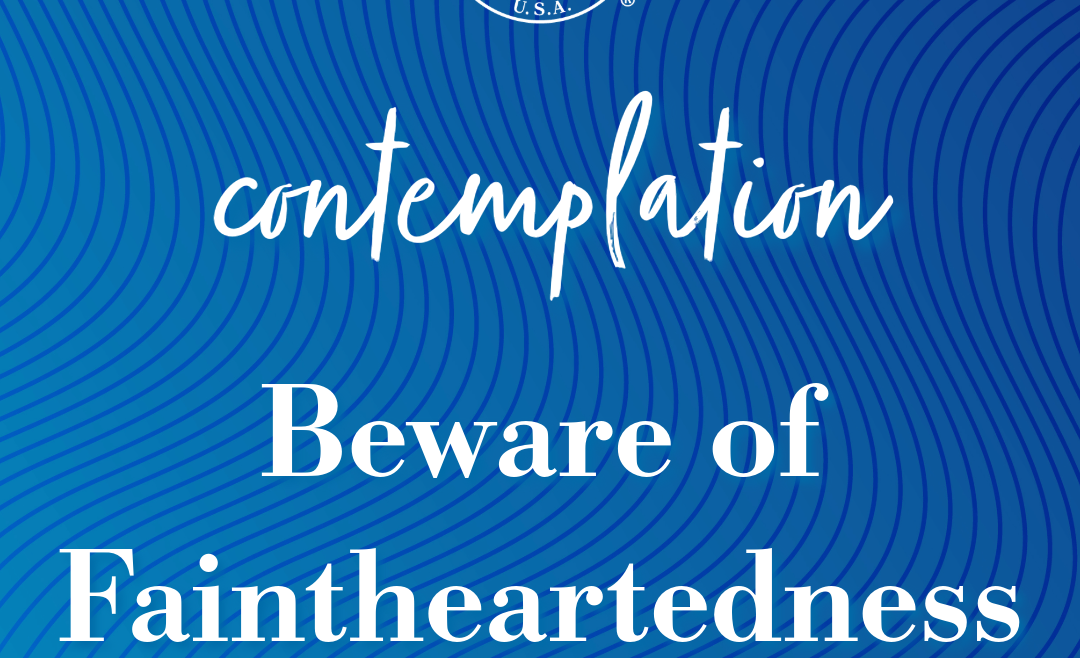By Timothy Williams, Senior Director of Formation and Leadership Development
Such turbulent times we live in, filled political polarization, social controversies, economic upheavals, natural disasters, wars and rumors of wars! It’s almost enough to make you throw up your hands and give up sometimes. Blessed Frédéric’s times were certainly no less turbulent, with the industrial revolution, epidemics, new forms of poverty, and multiple revolutions overturning France’s government every few years.
Yet rather than “despairing of your age,” Frédéric cautioned, “beware of that faintheartedness which leads so many to give up all effort when witnessing, as they say, the decline … of civilization, and who, by dint of announcing the approach of the country’s ruin, end by precipitating it.” [O’Meara, 244] By allowing the day’s own troubles to overwhelm us, in other words, we become part of the problem, when we should instead remember that we do not belong to this world. We do not serve in despair, but in hope, and the hope in which we serve, the hope we seek to share with the neighbor is the very hope that Christ shared with us.
Naturally, on Home Visits, in systemic change projects, and through our advocacy, we fully engage with the world as it is with our neighbors, our communities, and with other organizations. The first sign of hope we offer is food, rent, utilities, or other material, worldly things. And how can we do otherwise? We do not belong to this world, but it is where we live. Indeed, we have been sent into the world!
Again and again, Jesus provided for material needs, from the wedding at Cana, changing water to wine to keep the party going, to the loaves and fishes, when he took pity on the hungry crowds. But by these actions He was not teaching us to measure our success by the loaves, the fishes, or the casks of wine. As Frédéric put it, the letters we share with each other should not be “statistical documents where success is defined in prideful numbers,” but instead should “exchange ideas, inspiration perhaps, fears at times, and always hope.” [1372, to the Assembly, 1838]
If we measure our successes only by “prideful numbers,” we will always be disappointed. That is why The Society of St. Vincent de Paul is animated by a “spirit that animates us and that alone distinguishes us from other associations: we do not want to be a welfare office.” [1375, to Charuand, 1838] Above all other things we give, it is our friendship, understanding, and love that lead to hope – for ourselves, for the neighbor, and for our society.
“I have always belonged,” Frédéric once said, “to the party of hope…in fact, I believe in nothing else as far as politics are concerned.” [O’Meara, 243-4]
Contemplate
What is my deepest hope for each neighbor I serve?
Recommended Reading
Contemplación : ¡Cuidado con la cobardía!
Traducción de Sandra Joya
Vivimos tiempos tan turbulentos, llenos de polarización política, controversias sociales, trastornos económicos, desastres naturales, guerras y rumores de guerras. A veces, casi basta para darse por vencido. Los tiempos del beato Federico no fueron menos turbulentos, con la revolución industrial, epidemias, nuevas formas de pobreza y múltiples revoluciones que derrocaban al gobierno de Francia cada pocos años.
Sin embargo, en lugar de “desesperarse de la edad”, advirtió Frédéric, “tengan cuidado con esa pusilanimidad que lleva a tantos a renunciar a todo esfuerzo cuando presencian, como dicen, la decadencia… de la civilización, y que, a fuerza de anunciar la proximidad de la ruina del país, terminan por precipitarla”. [O’Meara, 244] Al permitir que los propios problemas del día nos abrumen, en otras palabras, nos convertimos en parte del problema, cuando en cambio deberíamos recordar que no pertenecemos a este mundo. No servimos en la desesperación, sino en la esperanza, y la esperanza en la que servimos, la esperanza que buscamos compartir con el prójimo es la misma esperanza que Cristo compartió con nosotros.
Naturalmente, en las visitas domiciliarias, en los proyectos de cambio sistémico y a través de nuestra defensa, nos involucramos plenamente con el mundo tal como es, con nuestros vecinos, nuestras comunidades y con otras organizaciones. La primera señal de esperanza que ofrecemos es la comida, el alquiler, los servicios públicos u otras cosas materiales y mundanas. ¿Y cómo podemos hacer otra cosa? No pertenecemos a este mundo. Este mundo es nuestro, pero es donde vivimos. ¡En efecto, hemos sido enviados al mundo!
Una y otra vez, Jesús proveyó para las necesidades materiales, desde la boda en Caná, cuando convirtió el agua en vino para que la fiesta continuara, hasta los panes y los peces, cuando tuvo compasión de las multitudes hambrientas. Pero con estas acciones, Él no nos estaba enseñando a medir nuestro éxito por los panes, los peces o los toneles de vino. Como dijo Federico, las cartas que compartimos unos con otros no deberían ser “documentos estadísticos donde el éxito se define en números orgullosos”, sino que deberían “intercambiar ideas, inspiración tal vez, temores a veces, y siempre esperanza” [1372, a la Asamblea, 1838].
Si medimos nuestros éxitos solo por “números orgullosos”, siempre estaremos decepcionados. Es por eso que la Sociedad de San Vicente de Paúl está animada por un “espíritu que nos anima y que es lo único que nos distingue de otras asociaciones: no queremos ser una oficina de asistencia social”. [1375, a Charuand, 1838] Por encima de todas las demás cosas que damos, es nuestra amistad, comprensión y amor lo que conduce a la esperanza, para nosotros mismos, para el prójimo y para nuestra sociedad.
“Siempre he pertenecido”, dijo una vez Frédéric, “al partido de la esperanza… de hecho, no creo en nada más en lo que respecta a la política”. [O’Meara, 243-4]
Contemplar
¿Cuál es mi esperanza más profunda para cada vecino al que sirvo?

